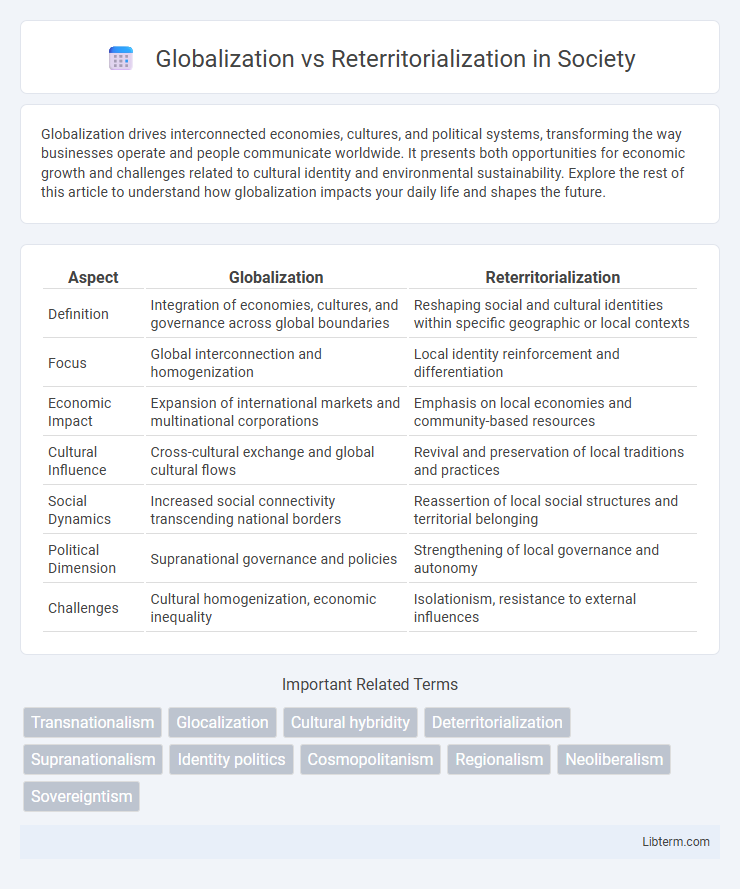Globalization drives interconnected economies, cultures, and political systems, transforming the way businesses operate and people communicate worldwide. It presents both opportunities for economic growth and challenges related to cultural identity and environmental sustainability. Explore the rest of this article to understand how globalization impacts your daily life and shapes the future.
Table of Comparison
| Aspect | Globalization | Reterritorialization |
|---|---|---|
| Definition | Integration of economies, cultures, and governance across global boundaries | Reshaping social and cultural identities within specific geographic or local contexts |
| Focus | Global interconnection and homogenization | Local identity reinforcement and differentiation |
| Economic Impact | Expansion of international markets and multinational corporations | Emphasis on local economies and community-based resources |
| Cultural Influence | Cross-cultural exchange and global cultural flows | Revival and preservation of local traditions and practices |
| Social Dynamics | Increased social connectivity transcending national borders | Reassertion of local social structures and territorial belonging |
| Political Dimension | Supranational governance and policies | Strengthening of local governance and autonomy |
| Challenges | Cultural homogenization, economic inequality | Isolationism, resistance to external influences |
Defining Globalization: A Contemporary Overview
Globalization refers to the increasing interconnectedness and interdependence of countries through economic, cultural, technological, and political exchanges. This process facilitates the flow of goods, services, information, and capital transcending national borders, shaping a globally integrated marketplace and society. Contemporary globalization is characterized by rapid digital communication, multinational corporations' expansion, and international policy coordination impacting local and global dynamics.
Understanding Reterritorialization: Key Concepts
Reterritorialization refers to the process by which cultural, social, or economic practices are reconfigured and localized within new or existing territories, often as a response to globalization. This concept emphasizes the adaptation and transformation of global influences to fit local identities and spatial realities, highlighting the dynamic interaction between global flows and place-specific contexts. Understanding reterritorialization involves analyzing how power, identity, and space intersect to reshape cultural landscapes and social relations in diverse geographic settings.
Historical Context: From Territorialization to Globalization
The historical trajectory from territorialization to globalization reflects the shift from rigid, localized control of space and resources to expansive, interconnected economic and cultural exchanges across the world. Territorialization emphasized the consolidation of power within defined geographical boundaries, as seen in the rise of nation-states and empires, while globalization dismantled these boundaries through advances in communication, trade, and technology, fostering transnational linkages. This transformation highlights the complex interplay between maintaining territorial sovereignty and navigating a globally integrated system shaped by capital flows, migration, and digital networks.
Cultural Dynamics: Identity in a Globalized World
Globalization accelerates cultural exchanges, blending identities and fostering hybrid cultural expressions across borders. Reterritorialization counters this by reinforcing localized traditions and cultural identities, asserting a distinct sense of place in response to global influences. The dynamic interplay between global cultural flows and local identity preservation shapes contemporary cultural landscapes, impacting social cohesion and individual self-conception.
Economic Impacts: Markets, Trade, and Labor
Globalization drives the expansion of international markets, increasing trade volume through reduced barriers and integrated supply chains, which stimulates economic growth but can also exacerbate income inequality. Reterritorialization emphasizes local economic control by fostering regional markets and protecting domestic industries, which may stabilize local labor but potentially limit access to global opportunities. The dynamic interplay between these forces shapes labor migration patterns, wage structures, and trade policies, influencing global and local economic resilience.
Technology’s Role in Shaping Global and Local Spaces
Technology drives globalization by enabling instant communication, digital trade, and cross-border data flows that integrate economies and cultures worldwide. Conversely, it supports reterritorialization through localized digital platforms, regional data centers, and customized content that reinforce local identities and governance. This dual role highlights technology as a critical force in both unifying global networks and empowering distinct territorial spaces.
Political Authority: Sovereignty in the Era of Reterritorialization
Political authority in the era of reterritorialization confronts challenges to traditional sovereign boundaries as global interconnectedness both undermines and reshapes state power. Sovereignty adapts through strategic recalibration of territorial control, enhancing localized governance while engaging with transnational actors and networks. This dynamic redefines state authority by balancing global integration with reasserted territorial claims, creating a complex interplay between global pressures and sovereign autonomy.
Case Studies: Local Responses to Global Forces
Local communities actively reinterpret global influences through retheterritorialization, adapting cultural practices and economic strategies to fit unique regional contexts. Case studies reveal how cities like Barcelona transform global tourism pressures into localized urban renewal projects, preserving heritage while embracing innovation. These responses demonstrate dynamic negotiation between global forces and local identities, fostering resilience and cultural diversity.
Globalization vs Reterritorialization: Challenges and Opportunities
Globalization drives economic integration and cultural exchange across borders, fostering innovation and expanding markets. Reterritorialization emphasizes the reassertion of local identities and sovereignty, presenting challenges to global supply chains and regulatory harmonization. Navigating these dynamics offers opportunities to balance global efficiency with local resilience, adapting strategies to shifting geopolitical and socio-economic landscapes.
Future Trends: Navigating a Hybrid Global-Local Landscape
Future trends in globalization and reterritorialization reveal a shift toward a hybrid global-local landscape where technological advancements and digital connectivity drive cross-border collaboration while emphasizing localized adaptation and cultural identity. Multinational corporations will increasingly adopt flexible strategies balancing global efficiencies with regional customization to enhance market responsiveness and consumer engagement. This hybrid model fosters economic resilience, innovation, and sustainable development by integrating global networks with local insights and resources.
Globalization Infographic

 libterm.com
libterm.com